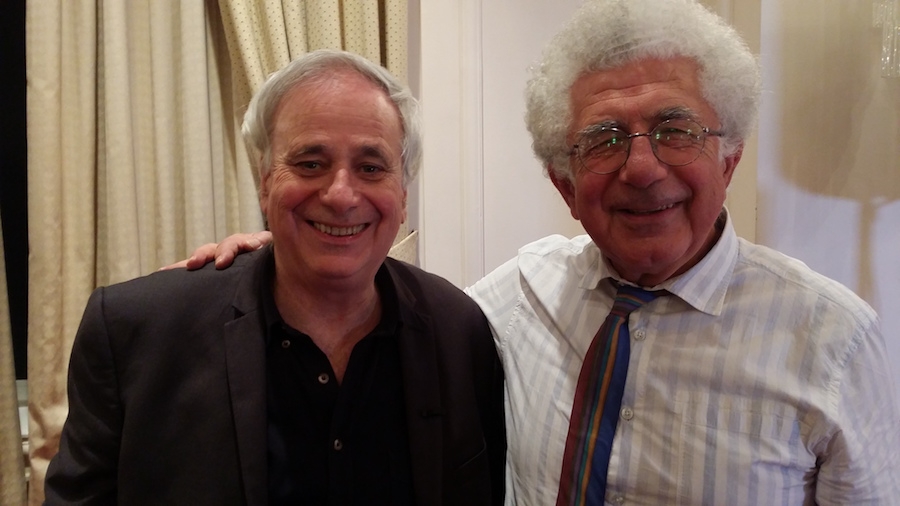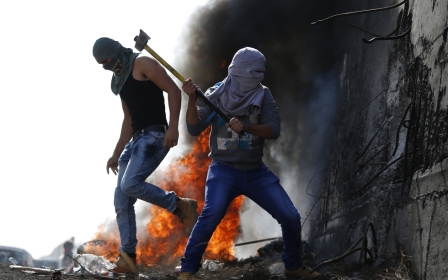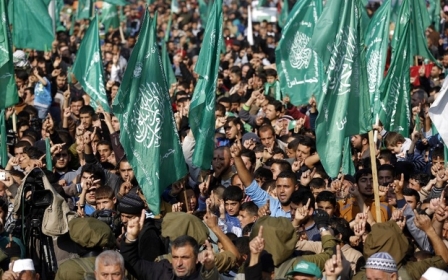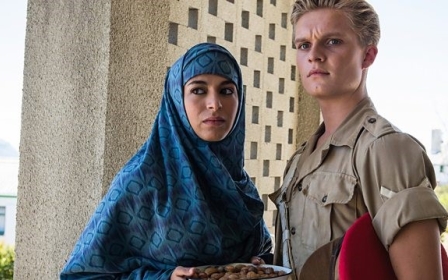Ilan Pappe wins lifetime honour at Palestinian book awards

Historian Illan Pappe was honoured with a lifetime achievement award at the sixth annual Palestine Book Awards held in London on Friday night, as four other authors received awards for their work on Palestine.
Receiving the award from Manuel Hassassian, the Palestinian Authority's representative in the UK, Pappe, who is considered one of Israel's so-called "New Historians", rewriting Israel's history since the release of top-secret British and Israeli official documents in the 1980s, said that while few people in Israel would see his work as legitimate, "this award is a reaffirmation that I do have a reference group".
Speaking to MEE ahead of the ceremony about his latest book, The Biggest Prison on Earth: A History of the Occupied Territories, Pappe said: "I see the whole project of Zionism as a structure not just as one event; a structure of settler colonialism by which a movement of settlers colonises a homeland.
"As long as the colonisation is not complete and the indigenous population resists through a national liberation movement, each such period that I'm looking at is just a phase within the same structure."
Bjorn Brenner and Leila Parsons shared the Academic Prize for their respective works, Gaza Under Hamas: From Islamic Democracy to Islamist Governance, and The Commander: Fawzi Al-Qawuqji and the Fight for Arab Independence 1914-1948.
"He stayed with us, lived with us, brought our voice to the fore," said Oxford professor Karma Nabulsi, as she invited Brenner to the stage to receive his prize for a book that took six years to write, including time spent in Gaza. She went on to praise Leila Parsons for choosing Arab archives over British or Israeli ones to "recreate an entire world".
Parsons linked the cause of Al-Qawuqji, an Arab nationalist leader who was born in the 19th century, to today. "My story is about colonial struggle. The colonial struggle is ongoing in Palestine."
Samia Halaby, abstract painter and influential scholar of Palestinian art, won the Creative Prize for Drawing the Kafr Qasem Massacre, which uses interviews with survivors and a set of her documentary drawings to highlight the 1956 massacre that was carried out by the Israeli Border Police in a Palestinian village.
Halaby said she was optimistic about the future of Palestine. "I'm certain that Palestine will be free. The main enemy is imperialism and imperialism has heart trouble. And a friend said that when you have heart trouble you die in five years or 25 years."
On the Arab-Jew, Palestine, and Other Displacements, a collection of writings by New York University professor Ella Shohat, won the Memoir Prize. Shohat, who identifies as an Arab-Jew and whose life journey has enabled her to reclaim her Iraqi heritage, said one day there would be a "just peace" for Palestinians.
Middle East Eye had spoken to Pappe and two other winning authors prior to the award ceremony, when they talked about Hamas, the situation in Gaza, Zionism and colonial perspectives in history.
Brenner's interview with MEE focused on the relationship between Hamas and Fatah in the West Bank.
"We saw this summer a close relationship with Hamas and Mohammed Dahlan, even though he was the head of security for Fatah in Gaza. Now they're prepared to work with him because it's the best choice they have. Hamas is a political actor that is much more concerned with manoeuvring politically than safeguarding its Islamist ideals," Brenner said.
Parsons, meanwhile, told MEE that she wanted to write a book not from a "colonial" perspective.
"I think that we have a relative lack of narrative histories of the Middle East in English to assign in the classroom. And one of the reasons for that is that ever since Edward Said published Orientalism, which I thought was a crucial intervention in the field, most academic historians began following him to write critical histories of colonialism in the region," she said.
"I really wanted to write a narrative history that was deeply researched. I wanted to make it based on Arabic sources, not on colonial sources," she said.
The Middle East Monitor (MEMO) website, which hosted the event, said it received about 40 submissions and will announce a shortlist of next year's candidates in the coming months.
Middle East Eye propose une couverture et une analyse indépendantes et incomparables du Moyen-Orient, de l’Afrique du Nord et d’autres régions du monde. Pour en savoir plus sur la reprise de ce contenu et les frais qui s’appliquent, veuillez remplir ce formulaire [en anglais]. Pour en savoir plus sur MEE, cliquez ici [en anglais].




